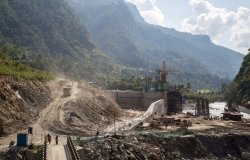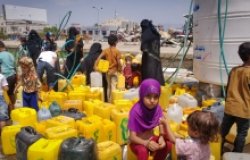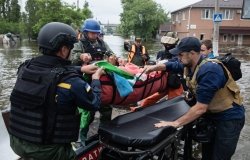Weathering Climate Change
Climate change poses fundamental economic, agricultural, political and security challenges to the United States, says former Congressman Lee Hamilton. The clock is running, and the world needs to act on what is perhaps the most complex item to ever appear on the international agenda.
(This op-ed appeared in the Indianapolis Star on October 19, 2009.)
"Problems have solutions, dilemmas have horns," one of my colleagues likes to say. And climate change is a dilemma with more horns than a rodeo.
Those horns will be prominent and sharp in December, when delegations from nearly 200 countries gather in Copenhagen for the United Nations Climate Change Conference. Preparations have been under way for months in an attempt to negotiate a successor treaty to the Kyoto Protocol, which was adopted in 1997 but never ratified by the United States.
The clock is running, and the world needs to act on what is perhaps the most complex item to ever appear on the international agenda.
Since the 19th century the Earth has warmed by 0.9 degrees. By the end of the 21st century, that number could be 4.3 degrees. The scientific consensus is that these changes are human-caused. Countries in the global north and south, developed and developing, the greenest and the biggest polluters—everyone will have to adapt.
Climate change poses fundamental economic, agricultural, political and security challenges to the United States. It will result in rising oceans encroaching on shorelines and valuable coastal wetlands, increased frequency and intensity of extreme weather events, generally less rain in dry areas and more rain in wet areas, new patterns of diseases, and a range of challenges to ecosystems, agriculture and water resources.
These transformations will act as a "threat multiplier," exacerbating pre-existing tensions across the globe. What's possible? Coastal flooding endangering 63 U.S. military facilities, intensifying resource competition in fragile states, the destabilization of energy infrastructures built on melting permafrost, and increasing demands for U.S. military involvement in disaster relief and stabilization operations.
As the world's largest consumer of hydrocarbons and second largest emitter of greenhouse gases (though largest in per capita terms), the United States must take a leadership role.
At the domestic level, the White House, all federal agencies, the Congress, state and local governments, the private sector, and the American people will have to cooperate to a degree rarely achieved to formulate credible responses promising substantial costs today and uncertain benefits in the future. Delaying action will only raise costs in the future.
Exacerbating the challenge are the widely varying perceptions of climate change among Americans. The government must better engage and harness the impressive knowledge of our scientific community and communicate facts to the public so that the policy process can proceed with popular support.
The House of Representatives recently passed a bill that aims to reduce emissions by 2050. But it's unclear whether legislation will reach the president's desk this year.
Achieving cooperation at the international level will be equally daunting. Emerging countries like China and India see universal emissions standards as an unjust restriction on their economic growth and their efforts to raise living standards.
The diversity of climate change's impact from region to region is another complicating factor.
We must also anticipate the second-order effects of our actions and avoid counterproductive policies. For instance, subsidizing corn-based ethanol has encouraged deforestation, led to food shortages, and over-taxed already dwindling water supplies. Demand for nuclear energy will certainly increase, but waste disposal and weapons proliferation remain concerns.
The House opted for cap and trade, while I and many others favor a carbon tax with a built-in rebate for low-income Americans. The tax would not aim to raise revenue, but rather to discourage consumption of fossil fuels.
Increased regulation and incentives for greater energy efficiency are likely, as is greater investment in alternative energy. International efforts must afford countries the necessary flexibility to address the threat through a combination of steps that includes emissions reductions and adaptation.
In addition to environmental costs, according to one estimate, every year the world fails to act adds another $500 billion to the bill of combating climate change. With the Copenhagen Conference approaching, action must match the seriousness of the climate change challenge.
Related Links
Related Program

Environmental Change and Security Program
The Environmental Change and Security Program (ECSP) explores the connections between environmental change, health, and population dynamics and their links to conflict, human insecurity, and foreign policy. Read more










